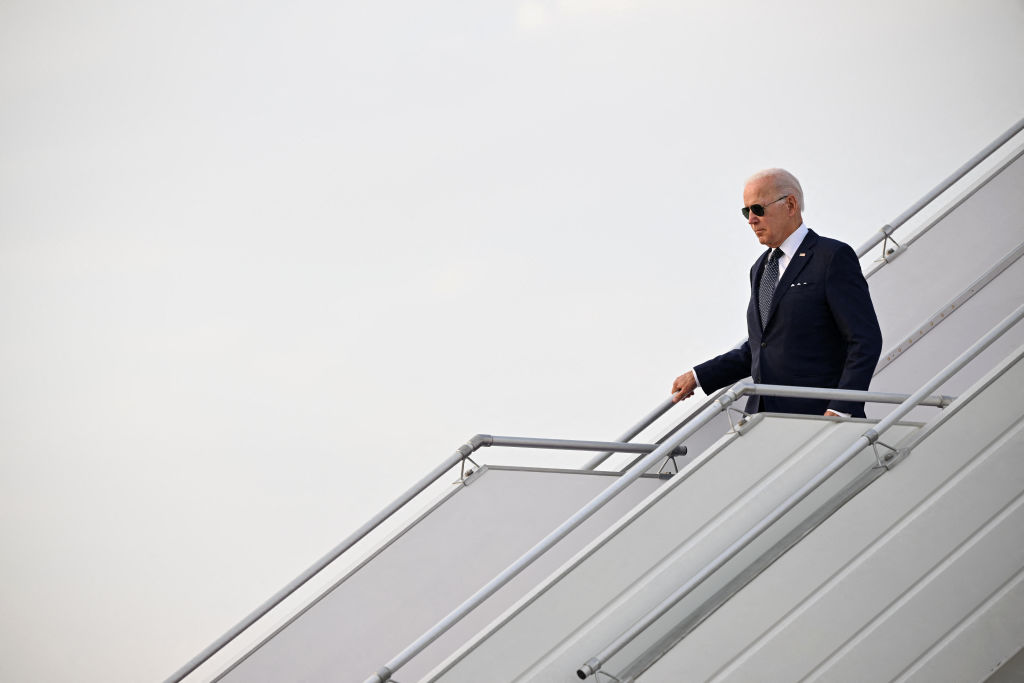
US President Joe Biden’s new vision of the Middle East publicised before his recent trip to Israel and Saudi Arabia appears very much like the old visions advanced by his predecessors, with some modifications. His pre-election rhetoric about America’s renewed commitment to human rights under his leadership and his promise to treat Saudi Arabia as a ‘pariah’ state after the murder of
Washington Post journalist Jamal Khashoggi have been all but forgotten.
Biden’s
cordial meetings with Crown Prince Mohammed bin Salman, whom American intelligence agencies found was directly responsible for Khashoggi’s killing, was a repudiation of all that he had promised in terms of promoting human rights. Even his assertion that he had raised the Khashoggi murder in a private meeting with MBS was politely
refuted by the Saudi foreign minister, raising questions about the president’s credibility.
Biden’s focus during his visit to Saudi Arabia was determined by the compulsions of geopolitics and geoeconomics. The high cost of oil, which threatens the health and viability of developed and developing economies alike,
was a primary consideration in placating the Saudi ruling elite, especially the crown prince (the de facto ruler of the kingdom), given Saudi Arabia’s position as the swing producer of oil. However, despite his conciliatory gestures, Biden was unable to get a firm assurance from the Saudis that they will help rein in oil prices by increasing production.
Another major American concern was to persuade the Saudis to accept Israel as a legitimate actor in the Middle East by building on Israel’s recent bonhomie with other Gulf states. While the Saudi government was willing to make small gestures such as allowing Israeli planes to fly over the country, it was unwilling to recognise Israel openly. In fact, it publicly made clear that it
will not recognise Israel and establish diplomatic relations with it until the Israel–Palestine issue is resolved to the satisfaction of the Palestinians.
A third major issue that the US administration was interested in was to convince the Gulf states including Saudi Arabia to further tighten the economic screws on Iran in the absence of the revival of the nuclear deal. Negotiations on the Iran nuclear deal have been held up because of differences between Iran and the US on several issues, above all the inclusion of Iran’s Islamic Revolutionary Guard Corps in the American list of terrorist organisations. This is akin to showing the red rag to the Iranian bull given the IRGC’s crucial role in the Iranian polity and economy.
The Gulf states have been
carrying on economic relations with Iran despite American sanctions, and Saudi Arabia itself has been holding strategic dialogues with Iran in order to improve relations between the two most important powers in the Persian Gulf as well as to help disentangle Saudi Arabia from the war in Yemen. It’s clear that signs of American retrenchment from the Middle East, despite Biden’s assurance to the contrary, have prompted the Arab countries of the Gulf to move to mend relations with Tehran fearing that the US won’t bail them out in case of an open confrontation with Iran.
Biden’s trip to Israel also broke no fresh ground. While he paid lip service to the two-state solution, he
uncoupled US–Israel relations from the Palestinian issue, making it clear that the time wasn’t ripe for a resolution of the dispute and that it had very little relevance for Washington’s relations with Israel. In terms of Arab–Israeli relations, Biden’s
favoured strategy was promoting regional integration via agreements akin to the Abraham Accords. The Palestinians don’t figure in this strategy. Although he didn’t go overboard à la Donald Trump in courting Israel, his ‘Zionist’ credentials and strong support for Israeli security ensured a warm reception for him in Israel.
Biden was also unable to change the Israelis’ stance on the revival of the Iran nuclear deal, which they oppose. He issued a
stern warning to Tehran while in Israel, declaring: ‘We will not … allow Iran to acquire a nuclear weapon.’ However, that wasn’t enough to satisfy Israeli Prime Minister Yair Lapid, who said that ‘the free world’ must not allow the Iranians ‘to develop their nuclear program’. As the
New York Times’ Jerusalem correspondent
pointed out, ‘The distinction between Mr Biden’s vow to stop a “weapon” and Mr Lapid’s insistence on destroying Iran’s entire “program” was more than semantic: It goes to the heart of their countries’ differing approaches in dealing with Iran’s nuclear ambitions.’
While Lapid wasn’t as brazenly confrontational as former prime minister Benjamin Netanyahu, it was clear that Biden had been unable to sway the Israelis to his point of view on the Iran nuclear deal despite his refusal to pressure Israel on the subject of a Palestinian state.
One of the factors that drove Biden to change his approach on human rights and in particular his critical stance vis-à-vis Saudi Arabia was the apprehension that Russian and, more importantly, Chinese inroads into the region both in economic and strategic terms were likely to harm American interests in the long run. But just as was the case with oil prices, he was unable to get any assurances from the energy-rich Gulf states on this count. It was mostly a one-way street, with the Saudis guaranteed rehabilitation in Washington after the Khashoggi episode and the Israelis reassured that the Biden administration won’t be unduly critical of their policies of establishing Jewish settlements in the West Bank and the creeping annexation of portions of the occupied territories.
The positive spin given to the ‘achievements’ of the Biden visit by Washington can’t hide the fact from discerning observers that the US got very little in the bargain.
 Print This Post
Print This Post